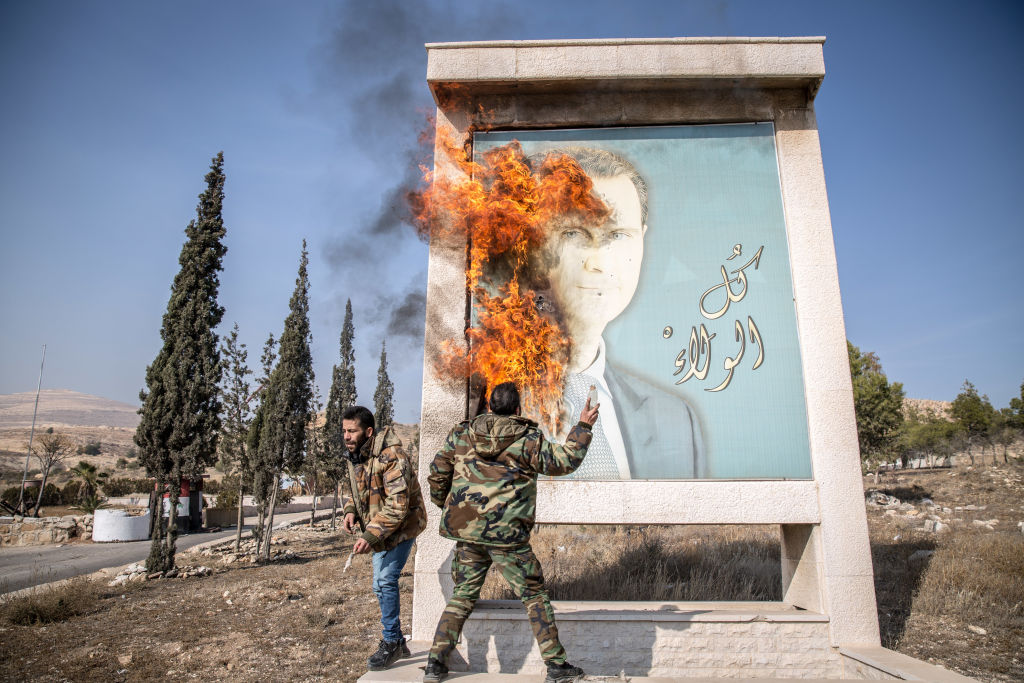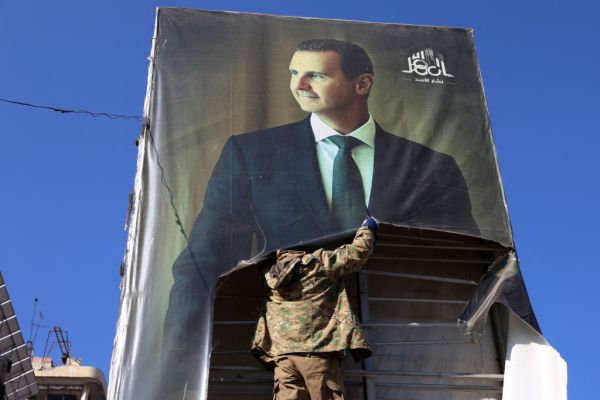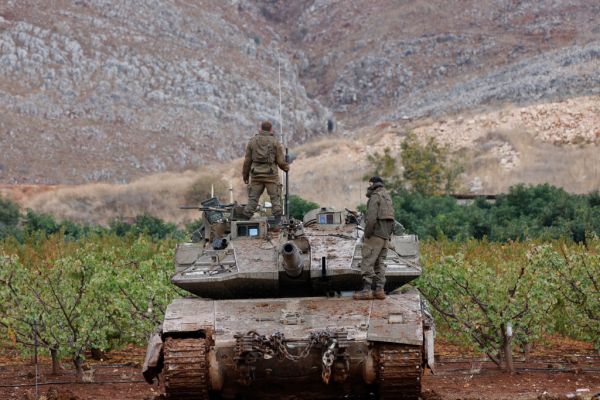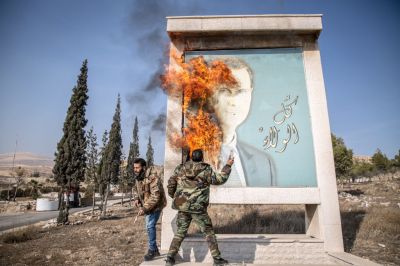Happy Tuesday! We were shocked to find out that the bald eagle isn’t already the national bird of the United States, but thankfully a bill is now headed to President Joe Biden’s desk to rectify this grave error 🦅🇺🇸🦅.
Quick Hits: Today’s Top Stories
- Ukrainian officials said Monday that North Korean troops fighting for Russia had taken heavy losses in the region of Kursk, the first reported casualties for the Russian ally. Both Ukraine and the Pentagon believe that roughly 12,000 North Korean soldiers are present in Kursk after the Kremlin deployed them to help take back the Russian region partially occupied by Ukrainian forces during an August offensive. “As we’ve said all along, those forces are legitimate military targets for the Ukrainians given that they are engaged in active combat ops,” said Pentagon spokesman Maj. Gen. Pat Ryder.
- The United States launched airstrikes Monday targeting Islamic State camps in Syria as part of the ongoing mission to degrade the terror group’s capabilities. The strikes killed 12 ISIS operatives in territory formerly controlled by the Assad regime and Russia, according to U.S. Central Command. “CENTCOM, working with allies and partners in the region, will not allow ISIS to reconstitute and take advantage of the current situation in Syria,” CENTCOM commander Gen. Michael Erik Kurilla said in a statement.
- German Chancellor Olaf Scholz’s minority government lost a confidence vote Monday, forcing an early election for the parliament in February. Scholz, the leader of center-left Social Democrats, had led a three-party coalition with the centrist Free Democrats and the progressive Greens until its collapse in November when he fired Free Democrat Finance Minister Christian Lindner. The parties agreed on February 23 for an early election, leading to Monday’s vote, which now allows President Frank-Walter Steinmeier to dissolve parliament.
- A 15-year-old female student shot a teacher and another student Monday at Abundant Life Christian School in Madison, Wisconsin. The shooter also died, according to police. Another six people were injured, including two students who are currently in critical condition. The shooter’s motives are currently unknown.
- The White House said Monday that a rash of drone sightings over New York and New Jersey in recent weeks was caused by the ordinary operations of commercial, hobbyist, and law enforcement drones. “Some of it’s manned, some of it’s unmanned. We absolutely acknowledge that a lot of these are probably drones, but they’re flying legally,” said White House adviser John Kirby. Officials reviewed more than 5,000 tips from civilians, and only 100 of which prompted further examination, they said.
- Justice Department officials said Monday that two men had been arrested under suspicion of exporting sensitive drone technology to Iran. An Iran-backed militia then used that technology in a January attack that killed three U.S. servicemembers in Jordan. Mahdi Mohammad Sadeghi, a dual Iranian-American citizen who prosecutors say worked at a Massachusetts semiconductor plant, was arrested in that state on Monday. Prosecutors allege that he worked with Mohammad Abedininajafabadi, an Iranian national who owns a drone systems company with alleged ties to the Islamic Revolutionary Guard Corps, to bypass U.S. export laws and funnel drone technology through a Swiss front company into Iran.
- Tiktok’s CEO Shou Chew met Monday with President-elect Donald Trump at Mar-a-Lago shortly after the company asked the Supreme Court to rule on the legislation that could ban the social media app in the United States. “I have a warm spot in my heart for TikTok because I won youth by 34 points and there are those that say that TikTok has something to do with it,” Trump said during a press conference earlier on Monday. During this year’s presidential campaign, Trump also said he would save Tiktok even though he sought to ban the app during his first term.
The Challenges Facing Syria’s New Leaders

In front of the Umayyad Mosque in Damascus last week, the leader of Hay’at Tahrir al-Sham (HTS), the Islamist group behind the fall of former Syrian President Bashar al-Assad’s dictatorial regime, hailed a new era for his country. “This victory, my brothers, is a victory for the entire Islamic nation,” said Ahmed Hussein al-Sharaa, formerly known as Abu Mohammad al-Julani. “This new triumph, my brothers, marks a new chapter in the history of the region, a history fraught with dangers (that left) Syria as a playground for Iranian ambitions, spreading sectarianism, stirring corruption.”
HTS has tried to portray itself as the legitimate and tolerant state authority in a religiously and ethnically diverse country that has been wrenched by war for more than a decade. But two key questions hang over the group. How committed is it to a non-sectarian, non-authoritarian, government? And can it actually stabilize Syria while other regional powers like Turkey jockey for influence?
Those questions are still very much open.
When Assad fled Syria on December 8, the geopolitical ground shifted underneath the country of 23 million, and the former regime’s two top foreign allies, Iran and Russia, suffered a severe setback. Iran lost a pillar in its “axis of resistance” and a friendly host for its proxy Shiite militias. Assad’s Syria also served as a crucial supply corridor to Hezbollah and Hamas, funneling arms and cash to the terrorist groups. That route is now gone, and thousands of Iranian military personnel and diplomatic staff have been evacuated from the country.
Russia, Assad’s other largest international backer, has also suffered embarrassment. It’s currently in the middle of a large-scale withdrawal of its forces from Syria, including its Mediterranean naval base in Tartus. Russian officials are reportedly scrambling to find a home for their departing naval assets in Libya’s port of Benghazi, but Moscow could potentially be left without direct access to the Mediterranean Sea.
With Russia and Iran both making fast retreats, HTS has signaled a pivot toward stability rather than continued revolution. Al-Sharaa announced in an interview on Sunday there will be no military conscription, and the new regime will focus on reconstruction. He said there will be immediate efforts to rebuild destroyed homes and return refugees, and that “all factions will be dissolved and there will be no weapons except in the hands of the state.” HTS has also said that it’s committed to a new, religiously tolerant state. “No one has the right to erase another group,” al-Sharaa said in an interview earlier this month with CNN. “These sects have coexisted in this region for hundreds of years, and no one has the right to eliminate them.”
A new caretaker government has been appointed under the leadership of Prime Minister Mohammed al-Bashir. Al-Bashir led the Syrian Salvation Government in northern Idlib province, the center of power for HTS and its coalition, and will lead a group of ministers from that same body. Set up to keep basic government services running, the caretaker administration has said it will remain in power until March. Political leadership, then, will be in the hands of HTS allies, but al-Bashir said last week that he’s working with government officials and civil bureaucrats from the previous government to help ensure continuity of government, perhaps signaling purges may not be on the horizon.
Some countries have begun cautiously reaching out to the new government. Secretary of State Antony Blinken said the American government had made “direct contact” with HTS on Saturday—the group remains a U.S.-designated foreign terrorist organization and the FBI still has a $10 million bounty on al-Sharaa. British Foreign Minister David Lammy, meanwhile, announced that the United Kingdom had opened diplomatic ties with HTS and noted that HTS remained a “proscribed terrorist organization, but we can have diplomatic contact and so we do have diplomatic contact.”
International observers are waiting to see whether HTS’ more recent pronouncements are genuine or part of a facade of moderation. In a meeting in Jordan this weekend, diplomats from the United States, the Arab League, Turkey, the EU, the U.K., and the U.N. (but absent Syrian representatives), produced the Joint Statement on Syria, a document calling for “an inclusive, non-sectarian, and representative government,” stressing “respect for human rights, including for women and minorities,” and emphasizing “combating terrorism and extremism.”
“Syria finally has the chance to end decades of isolation,” the group said.
“How can you not be an optimist?” Washington Post columnist Josh Rogin, who has reported extensively on Syria, told Jamie Weinstein on Monday’s episode of The Dispatch Podcast. Rogin argued that while HTS may be a terrorist group, it being only one part of a larger coalition and its willingness to hand off power are good signs. “Is it better or is it worse? It’s better,” he said, referring to life in Syria under the former regime. “Assad was worse. He was the worst thing you can imagine, a mass murdering, atrocity-driven dictator who was friends with Iran, friends with Hezbollah, friends with Russia.”
But other observers are more skeptical of HTS. “A reformed al-Qaeda group is a group that doesn’t behead Christians,” American Enterprise Institute senior fellow Michael Rubin, who has spent time in Kurdish-controlled parts of Syria, told TMD. “They only put them in prison.”
“[Al-Sharaa] can say the right things, but then if some of the groups underneath him do the opposite,” HTS could simply be “playing a game of good-cop, bad-cop,” Rubin argued.
The group’s recent governing record in Idlib province, which it has controlled for years, lends some credence to Rubin’s perspective. HTS authorities confiscated hundreds of properties of Christians, Druze (a small, idiosyncratic religious group that broke off from Islam), and Alawites (a Shia sect of which the Assads are members), with the latter two groups reportedly facing forced conversions.
Some regional actors aren’t waiting to see how things shake out. The Israel Defense Forces (IDF) conducted nearly 300 strikes in Syria over the weekend, targeting military installations and weapons depots. IDF troops also moved into the demilitarized buffer zone between Israel and Syria in the Golan Heights. Israeli officials have said that these operations are meant to deny “extremists” access to Syrian military stockpiles of heavy weapons and poison gas. The Israeli government also announced plans to double the population of the Golan Heights, in an effort to fortify the “new front.”
“Israelis aren’t quite sure what to make of HTS,” Raphael Cohen, the director of the Strategy and Doctrine Program at the RAND Corporation, told TMD. “They’re happy that Assad is gone, and they’re happy that Hezbollah loses a line of communication, but if it means a whole bunch of high-powered weaponry, chemical weapons, and advanced missiles falling into the hands of terrorists, they’re less happy about it.”
Israel’s airstrikes and forward deployments are attempts to get ahead of this eventuality, argued Cohen. With their recent lightning successes against Hezbollah and Iran in mind, Israeli officials likely see pre-emptive strikes against Syrian targets as a way to keep their various foes on the back foot. But Israeli strikes also risk delegitimizing HTS as it attempts to consolidate control, which could lead to a chaotic Syria on Israel’s doorstep yet again.
HTS has little ability to respond to Israel’s moves. “Syria’s war-weary condition, after years of conflict and war, does not allow for new confrontations,” al-Sharaa said in a TV interview Saturday. “The priority at this stage is reconstruction and stability, not being drawn into disputes that could lead to further destruction.”
Turkey is also looking to capitalize on Assad’s fall. Turkish President Recep Tayyip Erdoğan’s government has supported HTS indirectly but has also functioned as the primary backer of the Syrian National Army (SNA), which includes both more secular and Islamist groups that have sometimes been at odds with HTS. Turkey has for years backed proxy groups in northern Syria as a way to continue its campaign against the Kurds, who had reached an uneasy truce with Assad’s forces in order to defend against Turkey and its proxies.
Erdoğan could try to use the power vacuum in Syria as a chance to press home its campaign against the Kurds and expand its influence in the region, continuing his push to restore Turkey to its Ottoman-era role as the Middle East’s hegemon. If the conflict with the Kurds heats up, it could also threaten the roughly 900 U.S. troops stationed in Syria as part of a Kurds-aligned coalition combating the Islamic State. Further attacks on Kurdish areas, and even potential incursions by the Turkish military itself (already operating in parts of Syria), increase the odds of an armed incident between NATO allies. “There are only so many intellectual somersaults and permutations we can take before we recognize that Turkey is not our friend,” argued Rubin. “We’re coming much closer to Americans and Turks killing each other in Syria than anyone wants to admit.”
While the Assad regime, Russia, and Iran have largely been taken off the Syrian chessboard, the country still faces an uphill battle for stability. And if HTS is unable, or unwilling, to make the necessary reforms to gain Western support, Syria risks descending into bloody interreligious and interethnic violence.
“Even if [al-Sharaa] is sincere with regard to peace and reconciliation, you’re in a land of blood feuds: 600,000 Syrians have been killed, 10 times that number have been pushed into internal exile, and another 6 million people have been sent overseas,” Rubin said. “You think that all of those people are going to stand down on their blood feuds? To me, that’s incredibly naive.”
Worth Your Time
- Nicholas Carr, an author who’s chronicled how the internet affects our thinking, has an interesting new theory for why modern technological progress feels so small-scale. Writing for his Substack New Cartographies, Carr argued that innovation feels less radical than in previous decades because our goals have changed. “Innovation’s focus moves up through five stages, propelled by shifts in the needs we seek to fulfill. In the beginning come Technologies of Survival (think bow-and-arrow), then Technologies of Social Organization (think cathedral), then Technologies of Prosperity (think assembly line), then technologies of leisure (think TV), and finally Technologies of the Self (think Facebook, or Prozac),” Carr wrote. “We’re no longer changing the shape of the physical world or even of society, as it manifests itself in the physical world. We’re altering internal states, transforming the invisible self. Not surprisingly, when you step back and take a broad view, it looks like stagnation —it looks like nothing is changing very much.”
- Sen. Mitch McConnell, recently retired from his role as one of the modern Senate’s most effective majority leaders, penned an essay in Foreign Affairs arguing against the isolationist turn in his party’s foreign policy. “The right has retrenched in the face of Russian aggression in Europe, while the left has demonstrated a chronic allergy to deterring Iran and supporting Israel,” McConnell wrote. “Neither camp has committed to maintaining the military superiority or sustaining the alliances needed to contest revisionist powers. If the United States continues to retreat, its enemies will be only too happy to fill the void. Trump would be wise to build his foreign policy on the enduring cornerstone of U.S. leadership: hard power. To reverse the neglect of military strength, his administration must commit to a significant and sustained increase in defense spending, generational investments in the defense industrial base, and urgent reforms to speed the United States’ development of new capabilities and to expand allies’ and partners’ access to them.”
Presented Without Comment
New York City Mayor Eric Adams in an interview Sunday: “I am not not communicating with the president[-elect] about a pardon.”
President-elect Donald Trump during a press briefing on Monday on whether he’d consider a pardon for Adams: “Yeah, I would. I think that he was treated pretty unfairly.”
Also Presented Without Comment
Politico: Steve Bannon Floats an Unconstitutional Candidate: Trump in 2028
In the Zeitgeist
If you’re a fan of sibling duets, you’ll love this mesmerizing Tiny Desk Concert by Billie Eilish and her brother Finneas.
Toeing the Company Line
- In the newsletters: Kevin D. Williamson reflected on (🔒) political violence and Salman Rushdie, and Nick Catoggio explored (🔒) why Trump is backing down from some of his campaign pledges.
- On the podcasts: Sarah Isgur and David French discuss the latest drama on the 5th U.S. Circuit Court of Appeals and Texas Attorney General Ken Paxton’s abortion pill lawsuit on the latest episode of Advisory Opinions.
- On the site: Mike Warren breaks down the policy debate the left wants to have in reaction to the UnitedHealthcare CEO’s murder, David Drucker details how the MAGA movement has now become the Republican establishment, Kevin D. Williamson examines the growing unrest in China, and Chris Stirewalt unpacks Trump’s first post-election press conference.
Let Us Know
Are you optimistic about the future of Syria?







Please note that we at The Dispatch hold ourselves, our work, and our commenters to a higher standard than other places on the internet. We welcome comments that foster genuine debate or discussion—including comments critical of us or our work—but responses that include ad hominem attacks on fellow Dispatch members or are intended to stoke fear and anger may be moderated.
With your membership, you only have the ability to comment on The Morning Dispatch articles. Consider upgrading to join the conversation everywhere.